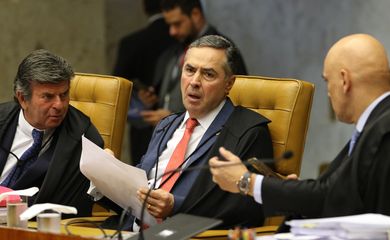Supreme court head: “Armed Forces did not succumb to coup‑mongering”

In his inaugural speech as head of Brazil’s Supreme Court, Justice Luís Roberto Barroso stood up for democracy and said the Armed Forces did not “succumb to coup-mongering.” He was referring to the riots of January 8, adding that his fellow justices are united in defense of democracy.

“The institutions prevailed, with the indispensable presence of civil society, the press, and the National Congress by their side. To be fair, at the most decisive moment, the Armed Forces did not succumb to the coup-mongering,” he declared.
On the role of the Judiciary branch, Justice Barroso said the Supreme Court has played its part, rather than engaging in judicial activism. The court, he argued, should operate with discipline and in harmony with the other branches of power.
“The court must act with self-restraint, in dialog with the other powers and society—as we have always tried to do, which I plan on further developing,” he vowed.
Justice Barroso joined the Supreme Court in 2013. He was appointed by then-President Dilma Rousseff to the seat left vacant by Justice Carlos Ayres Britto, who retired in November 2012 after turning 70. He thanked her for the appointment: “She appointed me to the position in the most republican way a president can act. She didn’t ask, she didn’t insinuate, she didn’t demand.”
Finally, Justice Barroso highlighted the Supreme Court’s measures in defense of fundamental rights.
“We have also acted in favor of black people’s efforts for recognition and equal opportunities, always having the Constitution as our basis, validating affirmative action, which is essential to overcome structural racism. Likewise, the LGBTQIA+ community has had important rights recognized by this court,” he concluded.
The swearing-in ceremony was attended by President Luiz Inácio Lula da Silva, vice-President Geraldo Alckmin, and lower house speaker Arthur Lira, and Senate head Rodrigo Pacheco, as well as other authorities.
Sworn in for a two-year term, Justice Barroso will stay in office until October 2025. He is taking the place of Justice Rosa Weber, who will retire compulsorily on Monday (Oct. 2) when she turns 75.



